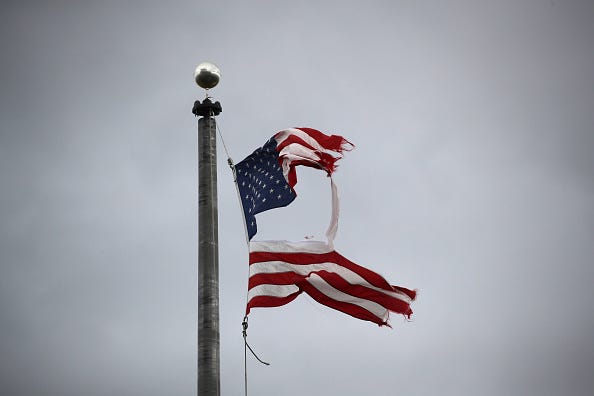Section 3 of the Fourteenth Amendment bans oath-breaking insurrectionists from holding office. The Supreme Court of Colorado has ruled that Trump's name should not appear on primary ballots in that state. In Trump v. Anderson, the Supreme Court will consider whether Colorado erred. Oral argument begins on Thursday.
Under Section 3 of the Fourteenth Amendment, Trump disqualified himself from office on January 6th, 2021, at the very latest, when he violated his oath of office and took part in an insurrection. All that remains to be seen is whether the Supreme Court will find some way to re-qualify him.
The purpose of Section 3 is to halt a disaster between oath-breaking insurrection and a civil war. It is triggered by the oath-breaking insurrection so that we never have another civil war (or similarly tragic event). Section 3’s specific punishment (not holding office) prevents a specific class of people (oath-breaking insurrectionists) from using the power of elected office to damage the republic.
As legal scholars Akhil Reed Amar and Vikram David Amar recall in their amicus brief, an insurrection against the United States began in late 1860, after the election of Abraham Lincoln, when some federal officers and legislators broke their oaths and aided what would become the confederacy. We date the Civil War from the fall of Fort Sumter in April 1861; this leads us to neglect these earlier events. Those who discussed Section 3 in 1866 and ratified it in 1868, though, recalled them. And so they wrote Section 3 to stop a future disaster somewhere between insurrectionist oathbreaking and civil war.
Trump's lawyers will argue that Section 3 was only meant to apply to events of the scale of the Civil War. Trump denied a presidential election result; tried to intimidate election officials; encouraged his followers to overthrow our constitutional order; encourages his followers to attack his designated enemies; and now threatens “bedlam” if he loses this case. Since none of this has yet caused a second civil war, his defenders will maintain that Section 3 does not apply to him.

Since the historical setting in 1866-1868 was the aftermath of the Civil War, we will be instructed, the people who framed Section 3 must have been thinking of the Civil War. And they were, of course. They wanted to prevent living oath-breaking insurrectionists from gaining power in the United States. And, having learned the lesson that our republic is vulnerable, they also wished to hold back future oath-breaking insurrectionists. They were thinking very reasonably. When you have faced an existential challenge, your thought is to prevent such a calamity in the future.
Legislators in 1868 were mindful not only of the Civil War (in our term), but with the prior betrayals of federal officers and legislators in late 1860 and early 1861. After Lincoln was elected but before he was inaugurated, for example, the sitting (lame-duck) secretary of war, John B. Floyd, took actions meant to aid the future confederacy. He later became a confederate general.
Although we might bracket the Civil War from the actions of federal officers and legislators who broke their oaths in late 1860 and early 1861, people in the 1860s would not have done so. For those who discussed Section 3 in 1866, oath-breaking insurrection was the outrageous opening to still more cataclysmic events. Amar and Amar suggest in their brief that the oathbreaking of sitting federal officers in late 1860 and early 1861 informed the definition of those to be targeted by Section 3: not all oath-breakers, not all insurrectionists, but precisely oath-breaking insurrectionists.
That is Trump: an oath-breaking insurrectionist. And in the most extreme sense, since he broke his oath while still in office in a way that undid the purpose of his office, which is the most important office in the land.
Hence the logic of Section 3: it enables the Constitution to defend itself by halting an oath-breaking insurrectionist at the right time, between the malice of the individual and the collapse of the institutions.
That, surely, was and remains the central point.
TS 5 February 2024
PS: The president was regarded as an officer in the sense of the wording of Section 3 at the time; and, yes, people at the time thought the provision applied to presidential candidates. Such issues are clarified in two amicus briefs from leading historians on the period, the Brief of 25 and the Brief of 5, which I summarized in another post.
PPS: I should mention that I co-signed another amicus brief, this one by experts on democracy, on the general subject of why contemporary democracies fail, and how events in the United States conform to dangerous patterns.
PPS: I will get back to writing about Ukraine soon. And there will also be a longer piece on what I think about the war in Gaza. With apologies to all of my international readers, I have been focusing on Trump's case in the Supreme Court because there are important arguments that deserve attention in a matter where, absent some seriousness of purpose, we will sleepwalk into bad decisions and needless tragedy.
PPS: I have edited this a bit to clarify that the Fourteenth Amendment was debated in 1866 and ratified in 1888. That was blurry in the original publication.




The Civil War is not mentioned in the 14th Amendment but the word "insurrection" is. So it's hard to see how SCOTUS can go along with Trump's claim that this section of the 14th Amendment only applies to the Civil War. Of course, all this could have been avoided if enough Republican Senators had had the courage to convict him of the impeachment charges.
“Section 3 of the Fourteenth Amendment bans oath-breaking insurrectionists from holding office.” Seems this should not only include trump but the Republican congressmen and others who participated in planning the insurrection. It shouldn’t be that hard for the court. We all are witnesses.